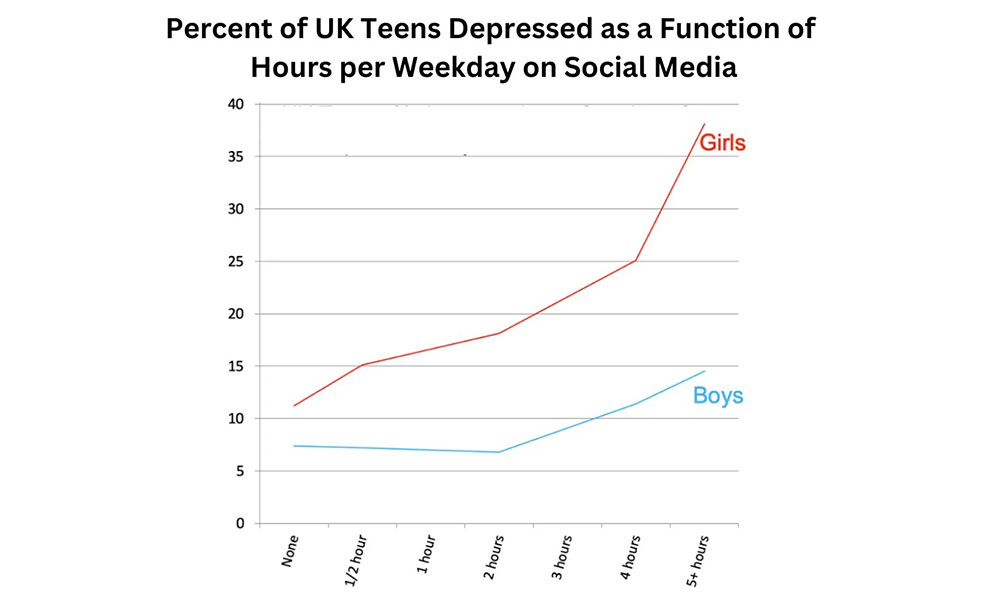
The link between teen girls’ mental health and social media usage is not just correlational, argues an NYU-Stern professor: There is now solid evidence that it is causal.
The argument coincides with the European Union banning TikTok from official devices, following similar moves in the US …
Teen girls mental health and social media
For many years now, academics have argued that although there is a correlation between the mental health of teen girls, and their social media usage, that does not necessarily mean that it is caused by use of the apps. Additionally, they have noted that the degree of correlation is rather small.
However, writes NYU-Stern social psychology professor John Haidt, there is now much better evidence of a causal link.
There is no disputing the scale of the growing problem.
The CDC’s bi-annual Youth Risk Behavior Survey showed that most teen girls (57%) now say that they experience persistent sadness or hopelessness (up from 36% in 2011), and 30% of teen girls now say that they have seriously considered suicide (up from 19% in 2011). Boys are doing badly too, but their rates of depression and anxiety are not as high, and their increases since 2011 are smaller.
However, in the past it has been said that it’s very difficult to prove cause and effect.
For example, Derek Thompson, one of my favorite data-oriented journalists, wrote a widely read essay in The Atlantic on the multiplicity of possible causes. In a section titled Why is it so hard to prove that social media and smartphones are destroying teen mental health? he noted that “the academic literature on social media’s harms is complicated” and he then quoted one of the main academics studying the issue—Jeff Hancock, of Stanford University: “There’s been absolutely hundreds of [social-media and mental-health] studies, almost all showing pretty small effects.”
That, says Haidt, is no longer the case.
In this post, I will show that Thompson’s skepticism was justified in 2019 but is not justified in 2023. A lot of new work has been published since 2019, and there has been a recent and surprising convergence among the leading opponents in the debate (including Hancock and me). There is now a great deal of evidence that social media is a substantial cause, not just a tiny correlate, of depression and anxiety, and therefore of behaviors related to depression and anxiety, including self-harm and suicide.
He provides evidence from a large-scale (n=19,000) study.

It’s impossible to do justification to the lengthy paper in a brief summary, but as one example …
The piece says that much research addresses all digital media usage, which includes things like watching Netflix. When you isolate social media apps specifically, then the data passes statistical tests to prove causation.
The Collaborative Review doc that Jean Twenge, Zach Rausch and I have put together collects more than a hundred correlational, longitudinal, and experimental studies, on both sides of the question. Taken as a whole, it shows strong and clear evidence of causation, not just correlation. There are surely other contributing causes, but the Collaborative Review doc points strongly to this conclusion: Social Media is a Major Cause of the Mental Illness Epidemic in Teen Girls.
European Union bans TikTok from official devices
On a related note, the European Union has asked all employees to remove TikTok from any devices which use corporate apps.
The EU executive’s IT service has asked all Commission employees to uninstall TikTok from their corporate devices, as well as the personal devices using corporate apps, citing data protection concerns.
The request to uninstall the Chinese-owned social media app was communicated via email to EU officials on Thursday morning (23 February).
It follows similar bans in the US.
TikTok told Euractiv that the action was “misguided” and based on “fundamental misconceptions.”
Photo: Zhivko Minkov/Unsplash
FTC: We use income earning auto affiliate links. More.


Comments